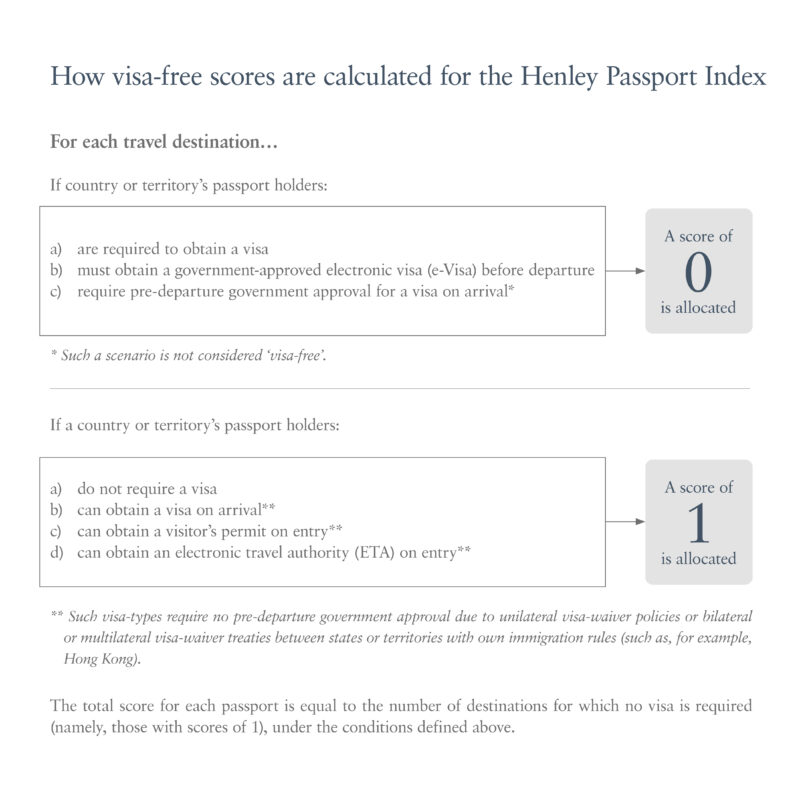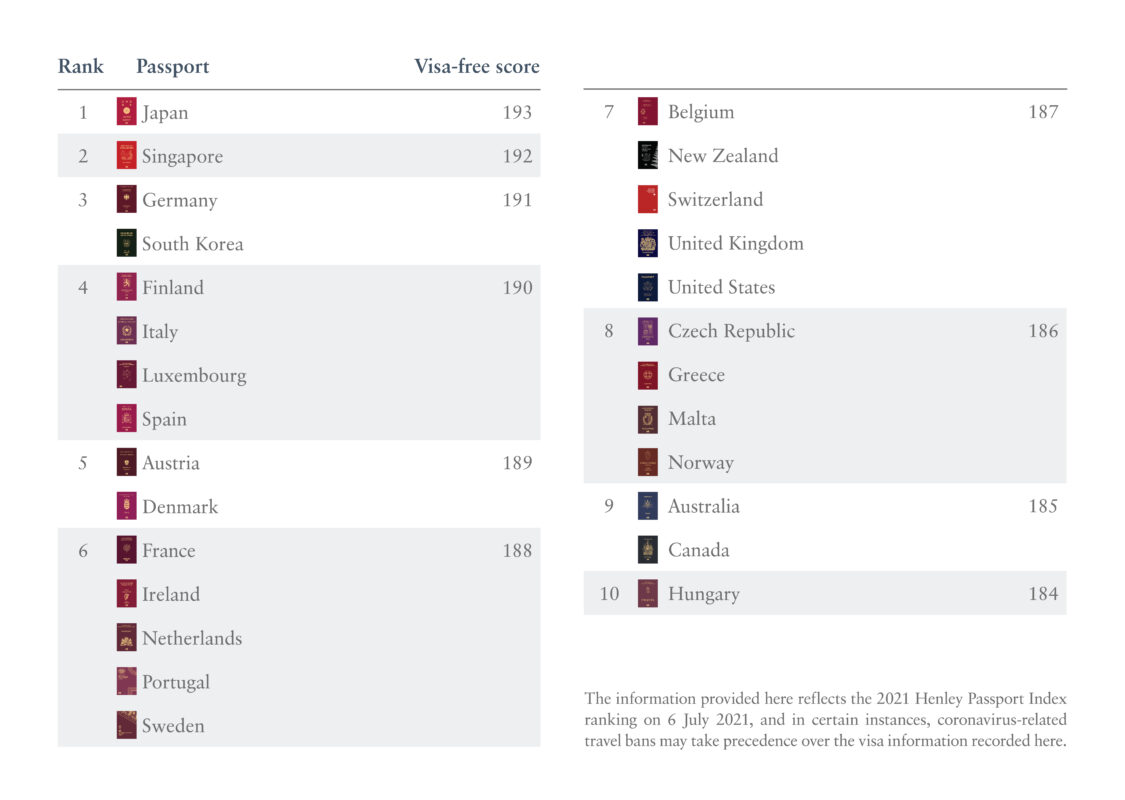International mobility levels remain very low despite the availability of Covid-19 vaccines, and many passports are gathering dust.
The latest results and research from the Henley Passport Index — the original ranking of all the world’s passports according to the number of destinations their holders can access without a prior visa — show that cause for optimism, should be tempered with the reality that international travel continues to be significantly obstructed. Cross-border travel, and particularly leisure travel, remains a remote possibility for the majority. A somber prognosis for countries in desperate need of tourist traffic to aid their economic recovery.
Although progress has been made since vaccines have been available, research by Henley & Partners revealed that between January and March 2021 international mobility had been restored to just 12% of pre-pandemic levels in the same period in 2019, and the gulf between the travel access represented by each country’s visa-free score, which in the current context if Covid-19 travel restrictions remains largely theoretical, and actual travel access offered even by high-ranking passports on the Henley Passport Index remains significant.
Since the Great Lockdown, temporary pandemic-related restrictions have taken precedence over long-term visa policy, resulting in few shifts in the index and rendering the concept of visa free travel freedom largely hypothetical. The latest results nevertheless provide interesting insights into what travel freedom means 19 months after the pandemic began.
Background and methodology
The Henley Passport Index (HPI) is the original passport index, with historical data spanning 16 years. The index and its contents are based on data that’s officially provided to Henley & Partners by the International Air Transport Authority (IATA) and supplemented, enhanced, and updated using extensive in-house research and open-source online data. We monitor daily media announcements regarding visa policy changes and confirm any changes by referring to the official government sites for relevant countries, for example https://evisa.dgdi.ga/ https://evisa.dgdi.ga/ https://evisa.moip.gov.mm/Home/NoticeToTourist https://suriname.vfsevisa.com/suriname/online/home/who-can-apply-for-eVisa https://mfa.gov.ua/en/consular-affairs/entry-and-stay-foreigners-ukraine/e-visa
Updated quarterly, the index includes 199 passports and 227 travel destinations, resulting in the most robust and reliable index of its kind.
For each travel destination, if no visa is required for passport holders from a country or territory, a score of 1 is allocated for that passport. A score of 1 is also applied if passport holders can obtain a visa on arrival, a visitor’s permit, or an electronic travel authority (ETA) when entering the destination. Such visa-types require no pre-departure government approval due to unilateral visa-waiver policies or bilateral or multilateral visa-waiver treaties between states or territories with own immigration rules (such as, for example, Hong Kong).

If a visa is required or a passport holder must obtain a government-approved electronic visa (e-Visa) before departure, a score of zero is assigned. A score of zero is also assigned if passport holders require pre-departure government approval for a visa on arrival, a scenario that is not considered ‘visa-free’.
The total score for each passport is equal to the number of destinations for which no visa is required (namely, those with scores of 1), under the conditions defined above.
Pandemic erodes strength of premium passports
While the dominance of European passports in the top 10 has been a given for most of the index’s 16-year history (this is due to each EU member state having visa-free access to all other member states as well as the historically well-established international relations of European countries), the pre-eminence of Japan, Singapore, and South Korea has become the new normal in recent years. Japan retains the number one spot, a position it has impressively held for the past three years, with a (currently theoretical) visa-free/visa-on-arrival score of 193. Singapore is in 2nd place, with a score of 192, and South Korea shares joint-3rd place with Germany, each with a score of 191.

However, when compared to the actual travel access currently available under Covid-related restrictions, even to the holders of top-scoring passports, the picture looks very different: in early July 2021, holders of Japanese passports had access to fewer than 80 destinations (equivalent to the passport power of Saudi Arabia, which is positioned far down in the ranking, in 71st place) while holders of Singaporean passports could access fewer than 75 destinations (equivalent to the passport power of Kazakhstan, which is in 74th place).
The outlook is similarly gloomy even in countries with successful Covid-19 vaccine roll outs. With their passport holders theoretically able to access 187 destinations, the UK and the US share joint-7th place on the index following their steady decline since sharing the top spot in 2014. Covid-related travel bans in early July saw UK passport holders suffer a drop in travel freedom of over 70%, and able to access fewer than 60 destinations — a passport power equivalent to that of Uzbekistan. US passport holders saw a 67% decrease in travel freedom, with access to just 61 destinations — a passport power equivalent to Rwanda’s.
Global mobility gap wider than ever
Despite the progress of vaccine rollouts, albeit uneven, and the relaxing of inbound travel restrictions in some countries, cautiousness will remain the status quo as governments look to manage the risks associated with the spread of new variants. In the developing world, the painfully slow pace of vaccination programs has raised profound concerns about vaccine access and inequality and the implications thereof for future global mobility, particularly given that developing countries already tend to have lower scores.
Considering the rankings of African countries, such concerns seem well founded. Nigeria is in 101st place, with access to 46 destinations, and the Democratic Republic of Congo is in 104th place, with access to only 43. Vaccine roll outs in both countries have been extremely limited, and the record-high global mobility gap between advanced and developing economies looks set to widen further in the months ahead.
The gap in travel freedom is now at its largest since the index began in 2006, with Japanese passport holders able to access 167 more destinations than citizens of Afghanistan, which is at the bottom of the index with a score of just 26.
The power of regional free movement agreements
In South America, it is interesting to note the clear advantages for passport holders of three main regional organizations that regulate human mobility: the Andean Community, the Southern Common Market, and the Union of South American Nations. South Americans travel to other countries in the region visa-free. Chile is in 16th place with access to 174 destinations, Argentina and Brazil are in joint-19th place with access to 170, and Uruguay is in 27th place with access to 153.
These examples are a glimmer of hope for mobility-strapped Africa, which is making strides in regional integration. The African Continental Free Trade Area (AfCFTA) came into effect on 1 January 2021, connecting 1.3 billion people across 55 countries with a combined gross domestic product valued at USD 3.4 trillion. The African Union’s Protocol on the Free Movement of Persons has not yet come into force, but when it does, it will allow African workers, students, researchers, and border residents to move freely between signatory states, which will facilitate the rebuilding of their economies and have a significantly positive impact on their regional, if not global, mobility.


